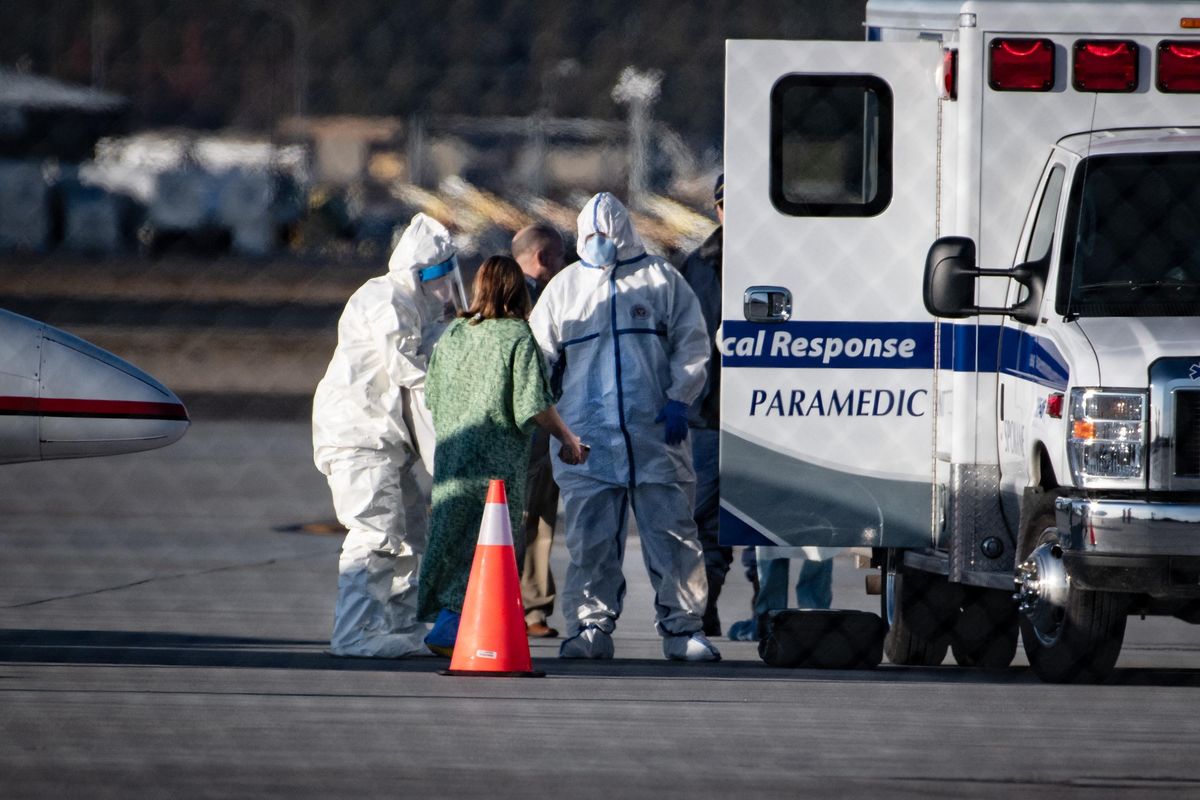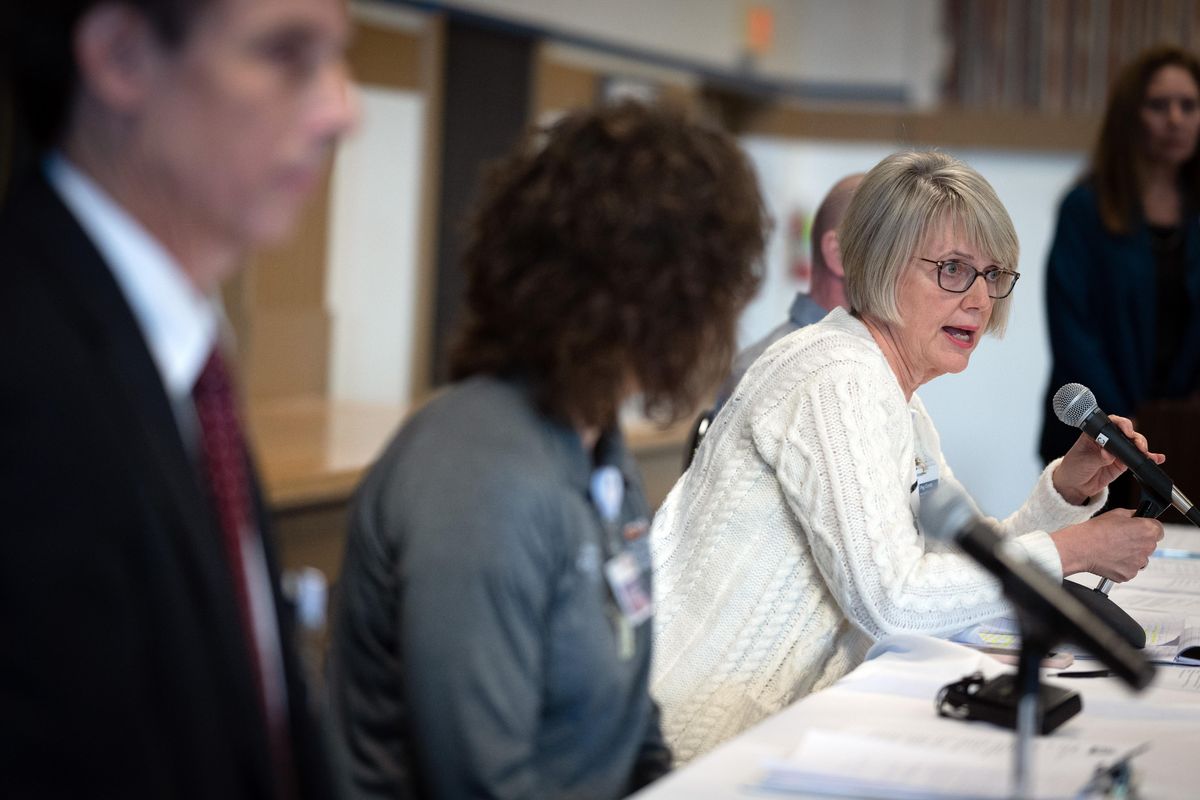‘No risk’ of contracting coronavirus from 4 patients in Spokane hospital, says official
One of two patients infected with the coronavirus is transferred from a Lear jet to a waiting American Medical Response ambulance Thursday afternoon at Spokane International Airport. The two coronavirus parents joined two others for treatment at Providence Sacred Heart Medical Center’s Regional Treatment Center/Special Pathogens Unit. (Colin Mulvany / The Spokesman-Review)Buy a print of this photo
Four patients who have tested positive for the new strain of coronavirus arrived at Providence Sacred Heart Medical Center on Thursday to receive treatment in the hospital’s special pathogens unit – one of 10 units in the country with federal certifications to treat highly infectious diseases.
The patients, all U.S. citizens, arrived at Spokane International Airport aboard a specialized medical transport plane. The plane made two flights, one in the morning and one in the afternoon, from Travis Air Force Base outside of Sacramento, California.
All four patients were in satisfactory condition. They are expected to receive treatment at Sacred Heart for at least two weeks in line with isolation protocols established by the U.S. Centers for Disease Control and Prevention.
Local health officials and Sacred Heart executives stressed that the risk to the general public in Spokane for contracting the novel coronavirus is low.
“Because of the well-practiced processes, this is a controlled situation,” said Dr. Bob Lutz, health officer of the Spokane Regional Health District. “There is no risk to the residents of Spokane County by bringing these individuals into our community for care.”
Federal agencies sent the patients to Spokane as part of an effort to repatriate U.S. citizens from China and other countries impacted by the coronavirus.
Lutz said the four patients are being treated at Sacred Heart at the request of the U.S. Department of Health and Human Services.
Local health officials did not say where the four patients came from, but the Associated Press, citing CDC officials, reported the patients had been passengers aboard the Diamond Princess cruise ship in Japan, which has been under strict quarantine with hundreds of confirmed coronavirus cases among people on board.
Late last week, there were 15 confirmed cases of the novel coronavirus in the United States. The first reported case was diagnosed and treated in Everett.
Those numbers appear to have grown as repatriation efforts have continued. About 400 U.S. citizens were aboard the Diamond Princess cruise ship, and the CDC initially set up quarantine sites for cruise ship passengers at the Air Force base in Sacramento and Joint Base San Antonio-Lackland in Texas. Passengers from the cruise ship were housed separately from other quarantined U.S. citizens, the CDC said on Saturday.
Two days later, 13 cruise ship passengers arrived for further treatment and testing at the University of Nebraska Medical Center, which has a 20-bed special pathogens unit. Staff there treated three patients for ebola during the 2014 outbreak.
HHS recently sent a letter to all U.S. citizens who had been aboard the Diamond Princess that they may not reenter the United States within 14 days of disembarking the ship. More than 100 U.S. citizens who have not disembarked the ship now must wait two weeks without having symptoms before they can board a flight back to the United States.
Sacred Heart is the designated special pathogens unit for the Pacific Northwest. This is the first time the unit has been operational, although training and testing have been ongoing since 2015. The unit is housed in a locked and secured unit in the east addition of the hospital.
“Our special pathogens unit is in an area separate from our main facility where we house most of our other patients,” said Peg Currie, chief executive at Sacred Heart. “ Patients in our facilities now can feel safe. We are operating normally; we are accepting patients; any procedures scheduled are going forward as planned.”
A team of nurses and respiratory therapists, who volunteered to be a part of the special pathogens team and have trained together on a quarterly basis, will treat the coronavirus patients. The 35-person team is well-prepared, the unit’s manager, Christa Arguinchona, said at a news conference Thursday.
“We have trained and exercised regularly for the last four years, in our unit and towards our scenario, as it played out earlier today with the transport, so these practices are things we do all the time,” Arguinchona said.
The special pathogens unit has 10 beds, but Arguinchona said a risk assessment based on patients’ conditions would determine how many more patients can be taken. The unit has its own lab, so any tests deemed necessary for coronavirus patients do not have to be moved throughout the hospital.
Only the CDC can perform the test to diagnose the novel coronavirus, also known as COVID-19, leading to lag times of up to a week.
“We had hoped to be doing state-level testing this week, if not last week, but the agents were faulty and we haven’t been able to do that,” Lutz said. “So all of these tests done get sent back to the CDC, with anywhere between a 72-hour to seven-day turnaround based upon the volume.”
Each member of the special pathogens team wears CDC-approved protective gear, including an impermeable gown, gloves, a filtration mask and a face shield. Staff also may wear an air-purifying respirator.
The first novel coronavirus patient in the United States was treated at Providence Regional Medical Center in Everett. While he initially presented mild symptoms, research revealed his condition had gotten progressively worse. The man developed pneumonia in both lungs on his ninth day of treatment.
Doctors got the man’s consent to use remdesivir, an experimental drug that was used to treat ebola, and his condition improved soon afterward. After a period of home isolation, the man has been cleared to resume activities, according to the Snohomish Health District.
Asked about the experimental drug used in Everett, Providence executives would not discuss possible treatment options.
“We are collaborating with our physicians, and we have a research department and if it is deemed necessary, we would explore all opportunities for providing whatever level of therapeutics that we could,” Arguinchona said. “I don’t have any knowledge of the patient in Everett.”
Health officials still are learning how COVID-19 is transmitted, but other coronaviruses are known to spread through close personal contact or airborne droplets – coughing or sneezing. People may also contract the illness if they touch a surface infected with COVID-19 and then touch their mouths, noses or eyes.
The World Health Organization reported 75,748 cases of the new coronavirus, with the vast majority in China, where the outbreak originated in December.
More than 2,000 people have died from the virus, most of them in China. The virus has not killed anyone in the United States. The flu, meanwhile, has killed 66 people in Washington state this season, including six in Spokane County.
But panic and overreaction to the new coronavirus has come as no surprise to Kari Nixon, an assistant professor at Whitworth University who researches medical humanities and contagious diseases.
“It demonstrates that cognitive dissonance because, when a disease is super present here, we pretend that it isn’t,” Nixon said. “The common denominator we see is that we think disease doesn’t affect us here if it’s an outbreak or pandemic; we don’t think it’s going to happen here.”
Local health officials said no one should worry about contracting the coronavirus from the patients brought to Spokane.
“The risk to the general community about this particular process is zero,” Lutz said. “I mean, because of the resources that have been brought to bear to ensure the individuals are brought from the airport to this facility, there is no risk to the general population.”
Correction: An earlier version of this story stated that the special pathogens unit at Sacred Heart Medical Center was a separate building, based on descriptions provided by Providence officials at the news conference. The special pathogens unit is not a separate building and is a locked and secured unit in the east addition of the hospital.
Editor’s note: On Feb. 21 this story was changed to reflect that Bob Lutz is the Spokane Regional Health District health officer, not a board member. We apologize for the error. On Feb. 24, this story was changed to correct the location of Travis Air Force base to outside of Sacramento, not in Sacramento.

